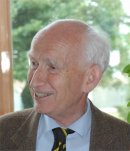|
Plenary
Lecture
Exact Optics of Fast Wide-Field Telescopes

Professor Donald Lynden-Bell
Institute of Astronomy
University of Cambridge
E-mail:
dlb@ast.cam.ac.uk
Abstract: Large telescopes have to be short and
therefore optically fast. This makes it difficult to
achieve wide fields. The subject's history is briefly
reviewed including projects yet to be completed. The
best combination of wide (> 4 degree) field and short
telescope achieved as yet is Willstrop's three mirror
telescope. The analytic theory of all three-mirror
aplanatic telescopes is then developed and the problem
solved for the special case of a parabolic primary.
Exploration of the problem for a primary of any given
shape is still in progress.
Brief Biography of the Speaker:
Donald Lynden-Bell is Emeritus Professor of Astrophysics
at the University of Cambridge where he held his chair
1972-2001. He was director of the University's Institute
of Astronomy 1972-77,1982-87,1992-94. After taking his
MA and PhD in Cambridge(1960)he was a postdoc at Caltech
and the Mt Wilson and Palomar Observatories where he
worked with Eggen and Sandage on Evidence as to how the
Galaxy formed. He returned to the Mathematics department
DAMTP in Cambridge and to his fellowship at Clare
College but then left for 7 years of astronomy at the
Royal Greenwich Observatory at Herstmonceux Castle in
Sussex. There in 1969 he produced his theory that
Quasars were giant black holes in the Nuclei of Galaxies
accreting matter. For this work he was awarded in 2008
the first Kavli prize in Astrophysics jointly with
Maarten Schmidt who discovered Quasars.
He is a fellow of the Royal Society, A foreign member of
the US National Academy of Sciences, a past president
and gold medallist of the Royal Astronomical Society, A
foreign member of the AAS and a Bruce Medallist of the
Astronomical Society of the Pacific. Interests include:
Relativity, Dynamics, Statistical Mechanics, MHD.
Galaxies. His first paper on optics was in 2002.
|
